Horse News
Member
Equestrian Boarder Do’s & Don’ts
There are many “common sense” factors with horse boarding… that aren’t always common. While some people have had wonderful boarding experiences, others…not so much. How do you ensure a top-notch boarding experience? By learning how to be an exceptional boarder!
There are several simple rules to follow to be a great boarder, like paying your bill on time and cleaning up after yourself. It’s also important to know the things you shouldn’t do, like using other boarders’ things or spreading gossip. If you’re not sure what you’re responsible for, ask your barn manager.
Above all else, taking proper care of your horse is your number one responsibility.
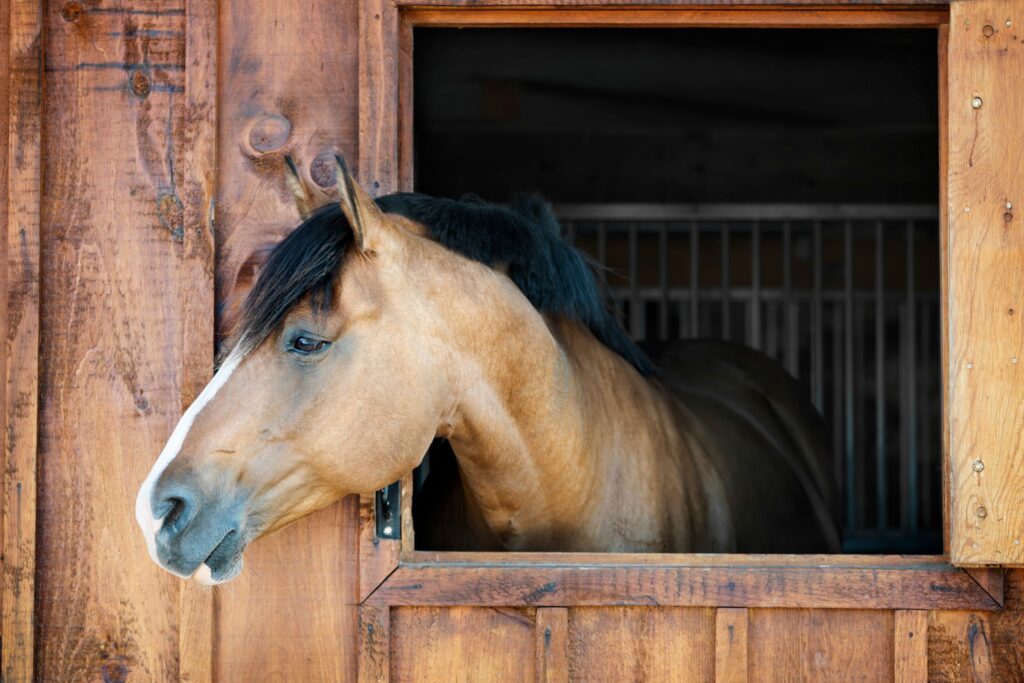
Source: Canva
Horse Boarding: A Brief Overview
Let’s talk about some of the basics of being a good boarder.
Barn Etiquette
A lot of these etiquette rules may seem like common sense, but you’d be surprised how often these rules aren’t followed.
Pay Your Bill – On Time!
Your barn manager isn’t taking care of your horse out of the goodness of her heart. If you don’t pay your bill, she can’t afford things like feed and hay. Make paying your boarding bill on time a top priority (turning in the check a few days early is ALWAYS better than being one day late).
Communication is Key
At some point or another, you’re going to run into an issue. Maybe your horse has lost some weight or is being bullied during turnout. Bring up any problems DIRECTLY to the barn manager. The good ones are always willing to help/make necessary changes.
Be Respectful
Always treat the barn manager and your fellow boarders with respect and kindness. Be polite at all times. Being respectful also means minding your own business (no one likes a boarder who gives unsolicited opinions).
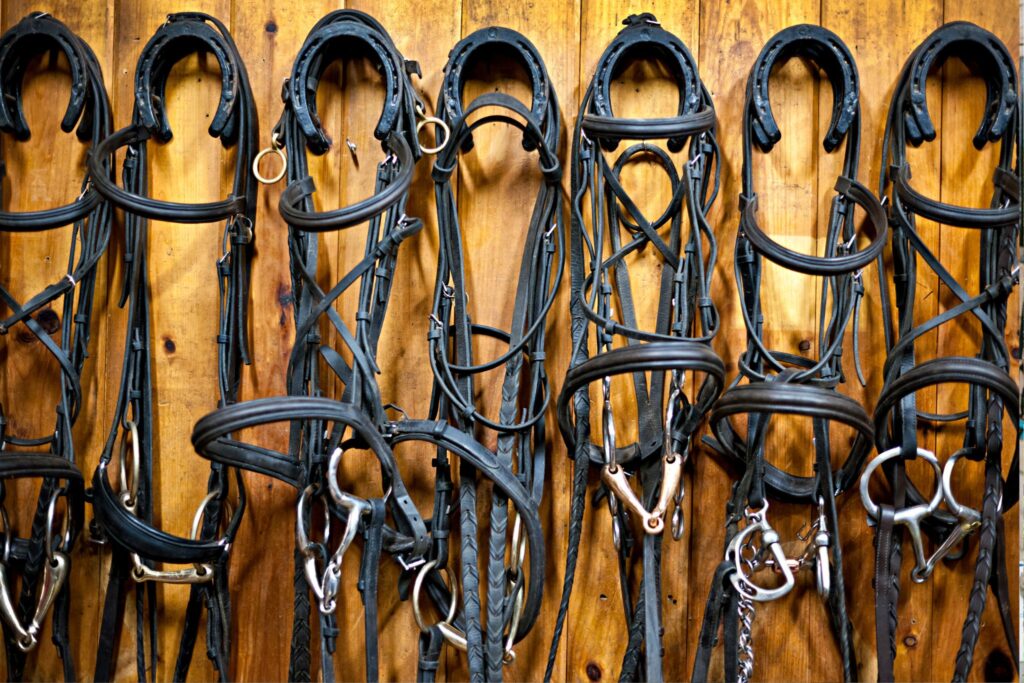
Source: Canva
- Clean up after yourself & your horse (this includes sweeping the aisle after you’re done, rolling the hose back up, putting arena obstacles back where you found them, etc.)
- If you open it, close it
- If you turn it on, turn it off
- Know & respect the barn hours
- If it’s not yours, don’t touch it (this goes for tack AND horses)
There is one exception to this rule: if a horse is in immediate, life-threatening danger, you may handle said horse (if neither the owner nor barn manager are present).
Lend a Hand
Even if you’re paying for full board, don’t be afraid to pitch in. Offer to help throw hay at dinner or pitch in with barn chores. Some barns have annual ‘cleaning days,’ where everyone gets together and scrubs mats, empties water tubs, etc.
Most barns don’t have enough staff, even on a good day, and the extra help goes a long way.
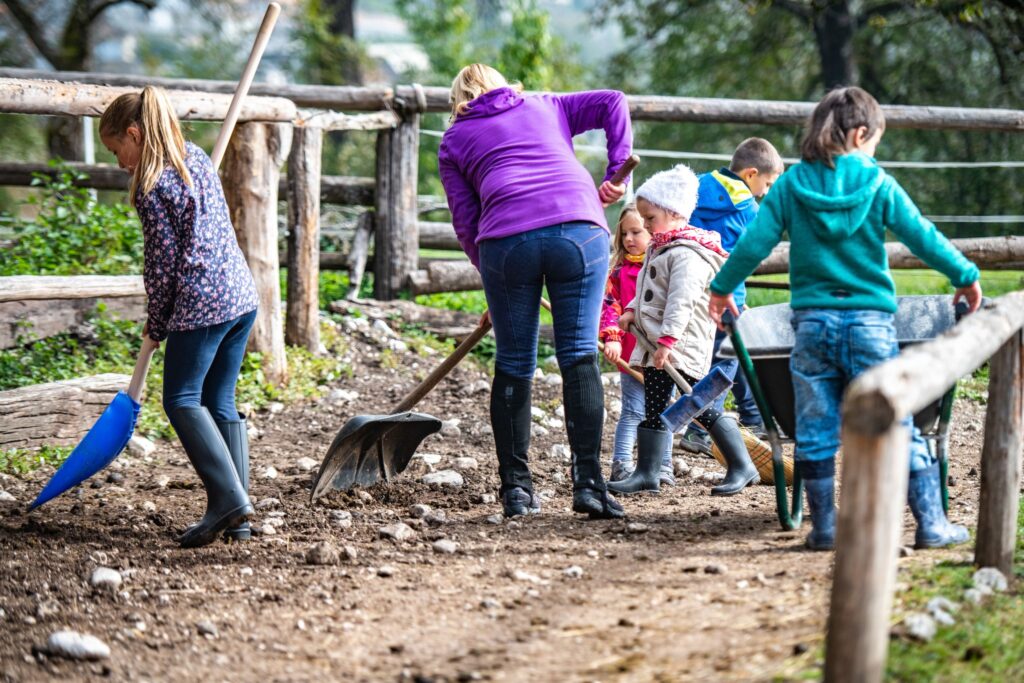
Source: Canva
Pay Attention
You can learn a lot by watching. Observe what others do and, if that behavior seems to be generally accepted and within the “barn rules,” it’s probably OK to mimic!
Things to Avoid Doing
Just like there are things you should do, there are plenty of things you shouldn’t do.
1. Don’t run, yell, etc.
Barns should be places of calm and quiet. Most horses don’t like loud noises or sudden movements.
If you have kids, make sure they’re allowed to be at the barn before you bring them, and make sure they understand how to behave while they’re there.
2. Don’t use other boarders’ things
NEVER use something that isn’t yours without explicit permission from its owner. Out of fly spray? It’s not okay to ‘borrow’ some from the bottle hanging on that stall.
Need a treat? Don’t take one that’s sitting on your neighbor’s shelf. If you need something, ask. Then remember to buy some for yourself next time you’re at the tack shop—and pay your neighbor back.
3. Don’t use extra hay, shavings, or grain without permission
Nothing makes a barn manager angrier than missing hay, grain, or shavings. They usually buy just enough for the month, and that “occasional” extra flake you throw to your horse adds up. If you want your horse to get extra hay, you can usually provide a couple of spare bales yourself.
Horse looking skinny? Talk to the barn manager about increasing his rations (depending on the amount of feed needed, you may have to pay a higher rate each month).
4. Don’t be a source of barn drama
Boarding facilities are social places, which means they’re ripe with potential drama. Don’t participate in gossip (or be someone who spreads it). If you notice a boarder is regularly trying to stir up trouble, have a quiet conversation with the barn manager.
Drama makes being at the barn uncomfortable for everyone.
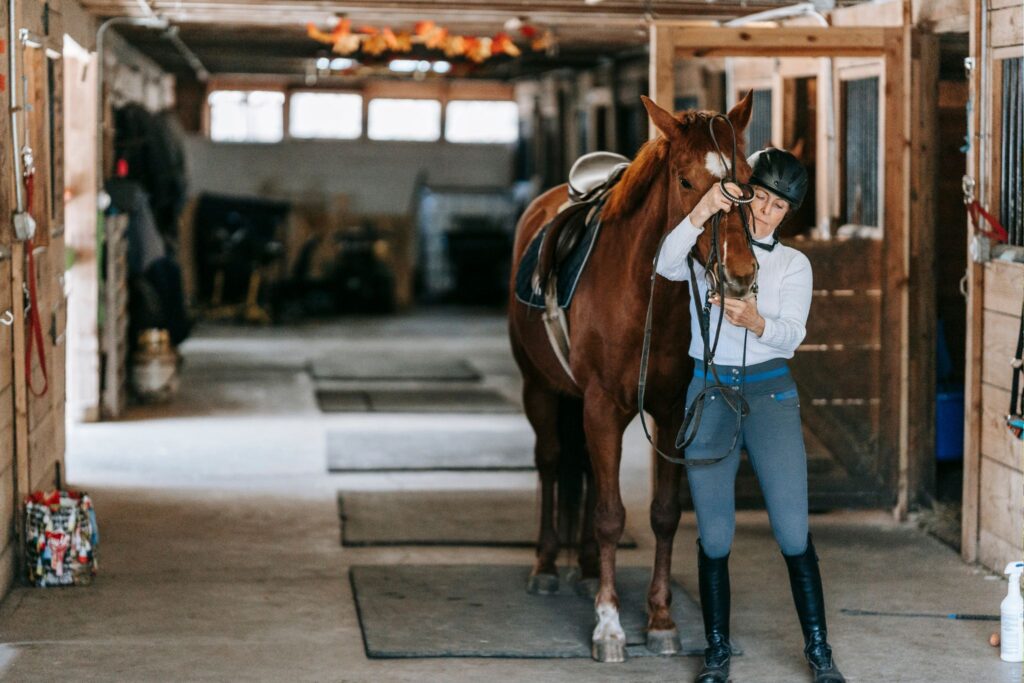
Source: Canva
Etiquette: English vs. Western
Despite the differences in tack and riding styles, boarding rules are much the same at English and Western facilities. Many horse owners prefer to board at barns where everyone practices the same riding style, but many places (especially at self- or partial-care facilities) offer a mix of both.
Horse Boarding Horror Stories
“A major hurricane was forecasted to hit our area, and evacuations were encouraged. The barn owner promised she’d stay at the property to make sure the horses were safe.
Turns out, she LEFT in the middle of the night and didn’t come back for several days. When I finally got access to the property, all the horses were in one tiny field, almost out of water and hay. My horses each lost nearly 100 lbs. from the ordeal!
I left the next day.”
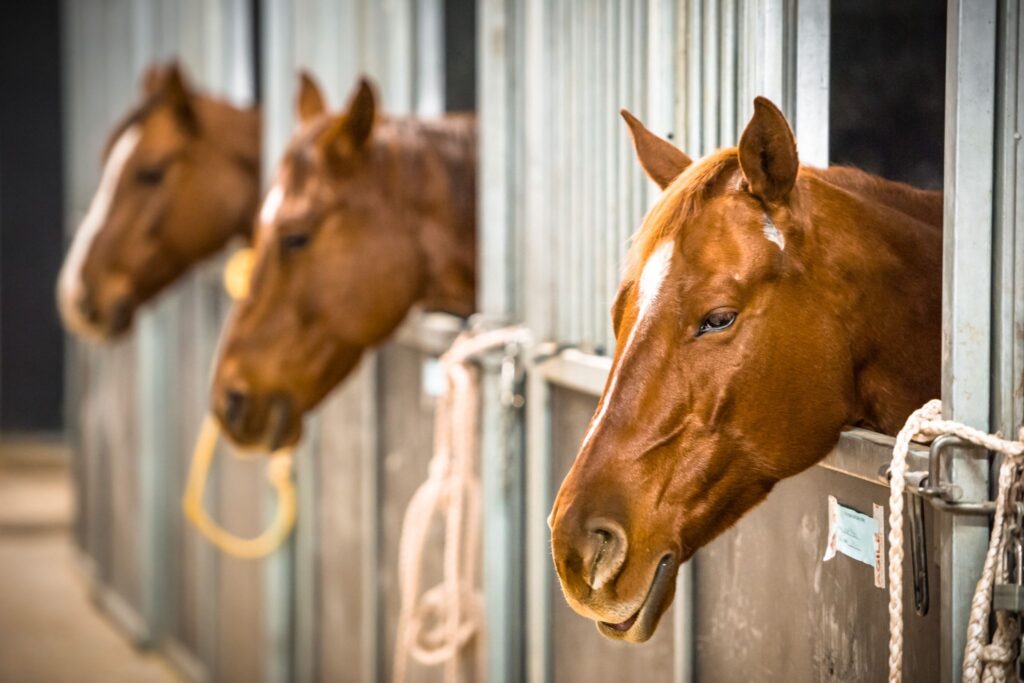
Source: Canva
“The first barn I rode at, we shared tack lockers. The guy I shared mine with CONTINUOUSLY used my stuff without permission. It drove me crazy!
I finally had to ask to switch lockers.”
“One time, I switched barns for better trail access. It was a small place, described as having a ‘family’ environment. When I came out to ride one day, both my horses were being used in a lesson! When I confronted the manager, she said she did this all the time. She viewed all the horses as ‘hers.’
I couldn’t move out fast enough.”
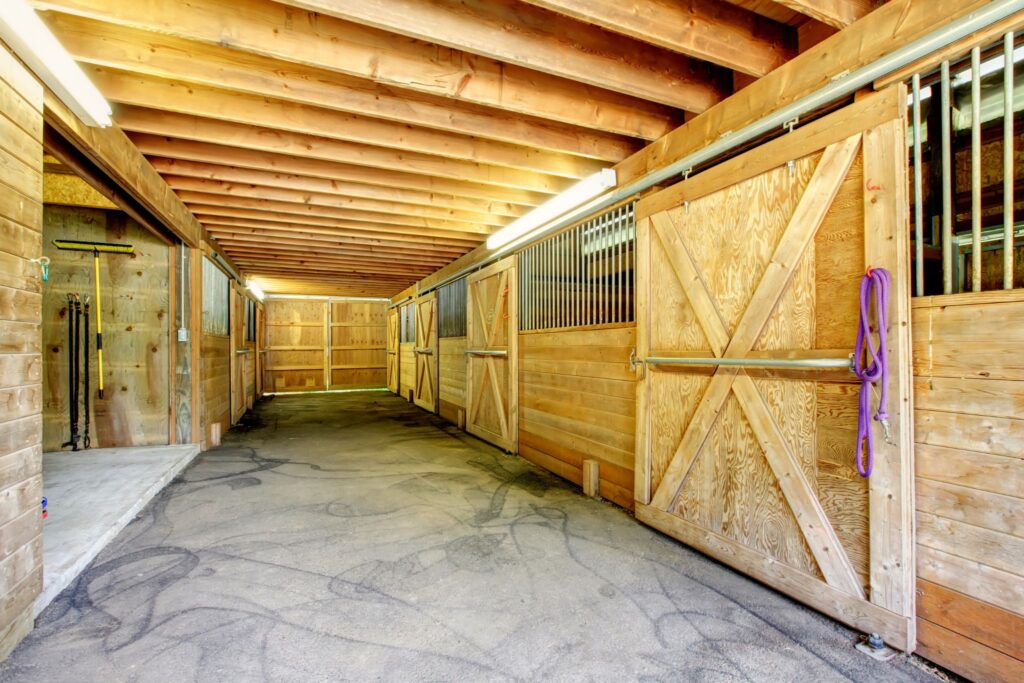
Source: Canva
Frequently Asked Questions
Q: What is a horse boarder responsible for?
The simplest answer is following all the barn rules. What you’re responsible for when boarding often varies, depending on what type of boarding situation you’re in.
Self-care: You provide hay, grain, and shavings, as well as cleaning your horse’s stall or pasture. In self-care situations, the boarders usually form a cooperative, and take AM/PM shifts to share the workload.
Partial board: This definition can vary widely, so always check with the barn manager. Typically, you provide hay/grain, and the barn manager will feed, turn out, and clean stalls.
Full board: Most people choose this option because it’s “all-inclusive.” In exchange for a set monthly fee, the barn manager will provide feed, hay, and shavings. She’ll also do the feeding, turnouts, and stall cleaning.
Some may even offer additional services, like blanketing, fly spray, hose-offs, or hoof-picking.
Q: What does horse boarding typically include?
Horse boarding can include anything from a pasture and/or a stall (for which you’re responsible for the day-to-day care and upkeep) up to full care (including regular grooming, training rides, and baths).
Always get clarity from the barn manager before moving in on what is (and is not) provided. Many boarders find full care the most convenient, so they don’t have to worry about weekly/monthly trips to the feed shop for hay, grain, and shavings.
Q: What is the profit margin on horse boarding?
The profit margin on horse boarding is usually pretty slim, ranging from 5% to 30%. There are many costs involved with horse boarding, including rent (or mortgage payments), water, electricity, feed, hay, shavings, repairs, grounds maintenance, and labor.
Many facilities will charge just enough to break even (or maybe pocket a little over breakeven) to keep boarding costs down. While this may be great for your pocketbook, you run the risk of the facility closing because they can’t pay their bills.
The real “money” in boarding often comes from the extras, like holding for the vet/farrier, trailering, lessons, clipping, etc.
Q: Is it cheaper to board a horse or keep it at home?
It’s usually cheaper to board because maintenance and repair costs are split between all boarders, rather than shelling out a few thousand out of pocket to fix or replace a fence at home. Boarding facilities can often get great bulk prices on hay and shavings, which can reduce costs.
Don’t forget about time. Can you spend several hours a day, every day, feeding, turning out, and maintaining your property? If your horse is retired, a simple pasture with a shelter at home may be more affordable than boarding, but if you’re an active rider, boarding may save you money in the long run.
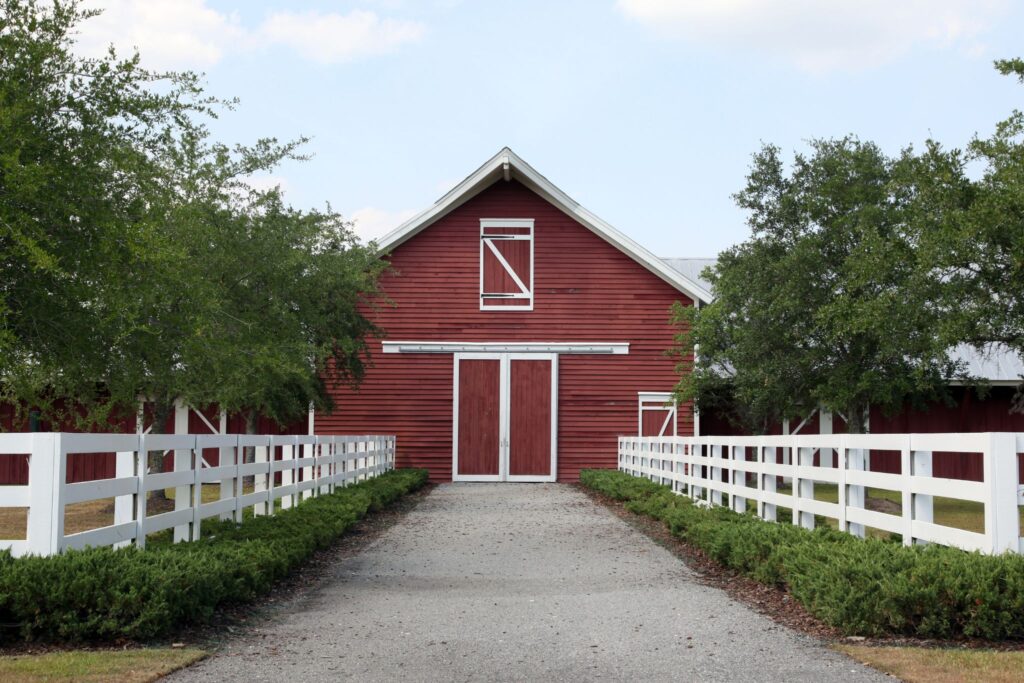
Source: Canva
Parting Thoughts
Boarding your horse can (and should) be a great experience, as long as you know what’s expected of you. While you may not have everything exactly the way you’d like it, you can sleep soundly knowing someone will always be around to take care of your horse.
P.S. Enjoy this article? Trot on over to:
- Equine Shelter 101: Do all horses need a stable?
- How Much Horses Cost & How Can You Actually Afford One
- Food or Foe: What Do Horses Eat (And Why)
- Neigh 911: Equine Emergency Preparedness Made Simple
- Home sweet stable: How big should a horse stall be?
- Horse Hay FAQs: List of Types of Hay, What Hay is Best, etc.
- Horse Care Terminology: Foreign Language or Feasible?
- How Horses Sleep: A-Zzz Guide to Equine Rest
- The Silver Lining: Horse Silver Wound Spray 101
Sources
Equine Boarding Stable Contracts | Extension Horses
Tips From the Pros: Starting or Expanding a Boarding Operation (stablemanagement.com)
The post Horse Boarding Basics (Etiquette *Everyone* Should Know) appeared first on Horse Rookie.
Continue reading...
